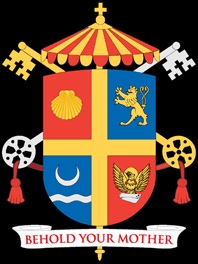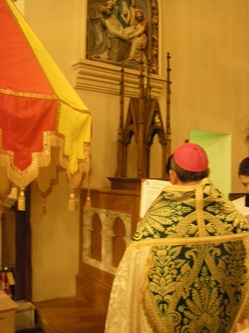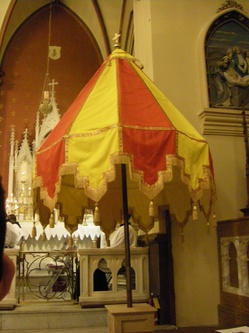Among the young saints of the Church are those who followed the Passionist charism, that is, those who made the paschal offering of Christ on the cross and His sorrowful mother so very central to their. The oblation of Christ crucified is THE Christian spirituality of our day, especially given the suffering many of us endure for the faith and for Saint Gabriel of the Sorrowful Mother is one such figure that we would do well to spend time learning. As the Mass collect above suggests, we are to ask for the grace to participate in the Lord’s Passion with the hope of his glory. This is the destiny of all Christians.
Archbishop Dolan notes a need for coherence in faith & public order
In a NY1 Exclusive interview with NY’s Archbishop Timothy M. Dolan the other day, the Archbishop spoke about many things including NY politics, culture and he distinguishes between being welcome to attend events and being honored at publicly sponsored Catholic events. A topic many Catholics are familiar with in recent years, especially at university graduation time. This is question is also on the plate since the St Patrick’s Day Parade is fast approaching at which the gay and lesbian activists normally cause a stir because of perceived anti-Catholic bias toward their lifestyle and then in fall there’s the Al Smith dinner where Catholics and politicos rub shoulders at a high profile dinner. People want to know what and how the Church is going to handle such situations; the Catholics need solid guidance and reasons for belief and hope. The Archbishop is clear that when it comes to faith and the public order people we need (want!) good leadership who live lives with honesty and that the public have an expectation that civil and religious leadership be questioned about their lives. Good governance depends on coherent life. Politically people are asking these questions in light of the recent troubles of NY governor David Paterson, a Catholic and yet pro-abortion, not to mention pro-liberal on all topics.
Iragi Christian community & the Dominican sisters in danger: Urgent prayers needed
This afternoon, I received a request for prayers, which I now recommend to you, for the Christians in Iraq. The following note was sent by Sister Donna Markham, the Prioress of the Adrian Dominicans:
Saint Walburga
Is Lent a time of healing for you?
In the Syriac Christian tradition the healing power of
Christ is presented to the faithful, by the Church, by knowing that the believing community of faith, is the Lord’s bride and our
mother. We know this experientially through the sacramental ministries of the priesthood. Saint Ephrem prays to Christ crucified and risen:
With three medicines
You have cured our sickness;
Humanity was weak, suffering and failing;
You have strengthened it by you blessed bread,
You have consoled it with your sober wine,
And You have given it joy with your anointing.
Lent is the springtime of our healing in mind, body and soul. Lent is a time to have the
great reversal happen: from weakness to strength, from sickness to health, from sinfulness to a
life of grace. This is all possible in the confession of sins, the worthy
reception of the Holy Eucharist, and the luscious anointing of the Holy Spirit
pour out over us.
Purifying our love
Let’s face it: many Christians find Lent meaningless. There are some among us who get their ashes, make some crazy resolution –give up the daily consumption of 5 beers, are nice to a sibling, do homework– to make “penance” and the season of Lent more “holy.” Silly things at Lent beget shallow experiences of conversion, perhaps even lend to a falsification of the Christian witness at during the time of Lent. Read the Pope’s lenten addresses an see what he has to say about the nature of this season we call purposeful, holy, penitential, even great. He would agree with me (wow that could be dangerous!) that unless you take Christ seriously who is standing in front of you in the person of your neighbor, Lent is going to be boring and miserable. How pure is your love for Jesus? How does your love for Jesus made real, concrete, fruitful? The following 3 paragraphs may begin to help answer these questions. Emphasis mine.
Christ attracts me primarily through things and people. My wounded, tired soul could stop at that. Idolatry is nothing other than to confuse the creature with the Creator, which is why there is a continual need for the purification of love.
My comments here come directly from a saying of Fr. Giussani that I have referred to many, many times and that, in the book I wrote about him, I cited as one of the loftiest, most impressive and truly innovative points in the Church’s recent
history: the definition of virginity as distance in possession, or possession that includes distance in it. We must take this expression in its entirety. In it is the exaltation of the human in Christ, which so characterized Fr. Giussani’s entire life, and the inevitability of sacrifice, which he always cited as the condition of the road. No one wants to do away with or repress friendship and sentiments, or to put them “in parentheses”, but we must be very clear and ask ourselves: what does God want of me? And what does that mean for the other, in light of the road that God has assigned to him?
Christ is not paradoxical. Christ gives us an abundance of human affections to help us to understand what it means to love him. It doesn’t scandalize me when someone says: “It seems that I love that person more than I love Jesus”, because our path towards the Infinite is without end, and, before you love the God that you don’t see, you love the neighbor that you see. But love the neighbor that you see so as to walk toward God, to walk toward the fullness of yourself.
An excerpt from an address tilted, “Our Fulfillment” by Father Massimo Camisasca, founder of the Fraternity of Saint Charles.
The Fraternity is an international missionary congregation of priests begun in 1985 as a response to the work of Monsignor Luigi Giussani. The Fraternity has about 100 priests in 20 countries and 30 in formation to be ordained priests. To read the rest of the address, click here.
The crucible of Lent: the Embertide
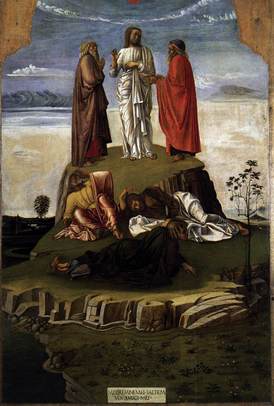 In the reformed Catholic Liturgy we hear little of the traditional days throughout the year given by the Church to pray in a more intense way and to fast in the light of the sacred Liturgy. Namely, Ember Days. Not only is it Lent but this week, Wednesday (today), Friday and Saturday, we have something extra added (at least we did, let me explain below): we offer to God the work and fruit of the season of spring and we ask God for blessings. In the old way of doing things deacons were ordained priests on Saturday. An intense sensibility of prayer and fasting make these days notable.
In the reformed Catholic Liturgy we hear little of the traditional days throughout the year given by the Church to pray in a more intense way and to fast in the light of the sacred Liturgy. Namely, Ember Days. Not only is it Lent but this week, Wednesday (today), Friday and Saturday, we have something extra added (at least we did, let me explain below): we offer to God the work and fruit of the season of spring and we ask God for blessings. In the old way of doing things deacons were ordained priests on Saturday. An intense sensibility of prayer and fasting make these days notable.
Is our practice of charity leading us anywhere?
How often do you think about the spiritual acts that you do, let’s say for Lent, are pleasing God? Why are you do act of penance? Really, why are you “giving something up for Lent”? If you are doing something to observe the 40 days of Lent, what or who is your guide, and why? How sufficiently aware are you when it comes to your attitudes, desires, ways of interacting with others? When I read the following passage these and other questions surfaced because the author is dead-on. In fact, he cuts a little too close to the heart.
children in the true meaning of Lenten penance for, as St. Leo the Great
comments: it is useless to deny food to the body if the soul does not reject
sin (4th Sermon of Lent). If mortification does not lead to an interior effort
to eliminate sin and practice virtue, it cannot be pleasing to God, who wants
us to serve him with a heart that is humble, pure and sincere.
the tendency to assert our ego too often lead us to put ourselves at the center
of the universe; we trample on the rights of others and in doing so evade the
fundamental law of brotherly love. That is why those Jews who fasted, wore
sackcloth and slept on ashes, but did not cease oppressing their neighbors,
were severely rebuked by God and their acts of penance were rejected. It is of
little or no use to impose physical privations on ourselves if we are unable to
renounce our own interests in order to respect and promote those of our
neighbor; if we will not give up our views in favor of some one else’s; if we
do not try to get along with everyone and bear wrongs patiently.
Scripture makes it very definite that what makes penitential practices
acceptable to God lies in the area of charity.
of St. Mary Magdalen, OCD
Basilica made in Stamford, Connecticut by Pope Benedict
 The Catholic faithful with their bishop, the Most Reverend William E. Lori, their pastor, Msgr. Stephen M. DiGiovanni and parochial vicars, gathered at the newly established Basilica of Saint John the Evangelist (Stamford, CT) tonight for Solemn Vespers and Benediction on the occasion of the Church receiving the dignity of a minor basilica by the Supreme Pontiff, Pope Benedict, XVI. It is one of 66 basilicas in the United States at this time. Also in attendance were Bishop Paul, Eparch of the Ukrainian Eparchy of Stamford and Bishop Basil the eparch emeritus with about 40 priests and seminarians.
The Catholic faithful with their bishop, the Most Reverend William E. Lori, their pastor, Msgr. Stephen M. DiGiovanni and parochial vicars, gathered at the newly established Basilica of Saint John the Evangelist (Stamford, CT) tonight for Solemn Vespers and Benediction on the occasion of the Church receiving the dignity of a minor basilica by the Supreme Pontiff, Pope Benedict, XVI. It is one of 66 basilicas in the United States at this time. Also in attendance were Bishop Paul, Eparch of the Ukrainian Eparchy of Stamford and Bishop Basil the eparch emeritus with about 40 priests and seminarians.
Bartholomew takes on critics of dialog, establishes Orthodox concern for Church unity
I’ve provided here excerpts of Bartholomew I’s Patriarchal and Synodal Encyclical, published on the Sunday of Orthodoxy (
Catholics have their own irrational critics of the ecumenical movement, but I think there is sometimes good reason for the ecumenical leaders to pay attention to thoughtful criticism. I think we have been saddled with misguided “ecumenists” who capitulate to others some substantial matters like the nature of truth, morals, the sacred Liturgy, dogma, ecclesiology, teaching authority, etc.
But with this patriarchal letter, Bartholomew sets the stage for thinking intelligently and faithfully in an effort to work toward unity among Christians, without which the Christian witness to Christ as Lord and Savior and the sacramentality of the Church is weakened. There are matters raised by the critics that need to be dealt with directly, like: To what end do the dialogues aim? Is full, visible unity possible, or are we wasting our time? Can a selective reading of history be set aside and real scholarship emerge to shed light on historical events and gestures and theological reflection? How do we discern the work of the Holy Spirit in the dialogues? Are truth claims made by the Churches (
Funny, this letter will be read by the Catholic world on the ancient feast of the Chair of Peter on who whose witness we rely on for Christian unity. Would that the irony might be an opportunity for more concrete expressions unity of life in Christ. What Bartholomew says of the Orthodox Church is applicable to the Roman Church. Emphasis is mine.
May Saint Peter and Saint Andrew with Mary, Mother of God, pray for us.
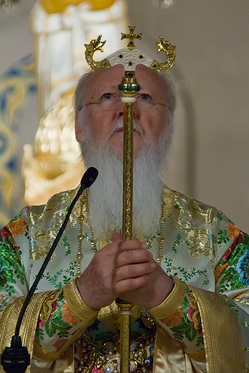 With a sense of duty and responsibility, despite its hurdles and problems, as the First-Throne Church of Orthodoxy, the Ecumenical Patriarchate cares about protecting and establishing the unity of the Orthodox Church, in order that with one voice and in one heart we may confess the Orthodox faith of our Fathers in every age and even in our times. For, Orthodoxy is not a museum treasure that must be preserved; it is a breath of life that must be transmitted and invigorate all people. Orthodoxy is always contemporary, so long as we promote it with humility and interpret it in light of the existential quests and needs of humanity in each historical period and cultural circumstance.
With a sense of duty and responsibility, despite its hurdles and problems, as the First-Throne Church of Orthodoxy, the Ecumenical Patriarchate cares about protecting and establishing the unity of the Orthodox Church, in order that with one voice and in one heart we may confess the Orthodox faith of our Fathers in every age and even in our times. For, Orthodoxy is not a museum treasure that must be preserved; it is a breath of life that must be transmitted and invigorate all people. Orthodoxy is always contemporary, so long as we promote it with humility and interpret it in light of the existential quests and needs of humanity in each historical period and cultural circumstance.
To this purpose, Orthodoxy must be in constant dialogue with the world. The Orthodox Church does not fear dialogue because truth is not afraid of dialogue. On the contrary, if Orthodoxy is enclosed within itself and not in dialogue with those outside, it will both fail in its mission and no longer be the “catholic” and “ecumenical” Church. Instead, it will become an introverted and self-contained group, a “ghetto” on the margins of history. This is why the great Fathers of the Church never feared dialogue with the spiritual culture of their age – indeed even with the pagan idolaters and philosophers of their world – thereby influencing and transforming the civilization of their time and offering us a truly ecumenical Church.
Today, Orthodoxy is called to continue this dialogue with the outside world in order to provide a witness and the life-giving breath of its faith. However, this dialogue cannot reach the outside world unless it first passes through all those that bear the Christian name. Thus, we must first converse as Christians among ourselves in order to resolve our differences, in order that our witness to the outside world may be credible. Our endeavors for the union of all Christians is the will and command of our Lord, who before His Passion prayed to His Father “that all [namely, His disciples] may be one, so that the world may believe that You sent me.” (John 17.21) It is not possible for the Lord to agonize over the unity of His disciples and for us to remain indifferent about the unity of all Christians. This would constitute criminal betrayal and transgression of His divine commandment.
It is precisely for these reasons that, with the mutual agreement and participation of all local Orthodox Churches, the Ecumenical Patriarchate has for many decades conducted official Panorthodox theological dialogues with the larger
These dialogues, together with every effort for peaceful and fraternal relations of the Orthodox Church with other Christians, are unfortunately challenged today in an unacceptably fanatical way – at least by the standards of a genuinely Orthodox ethos – by certain circles that exclusively claim for themselves the title of zealot and defender of Orthodoxy. As if all the Patriarchs and Sacred Synods of the Orthodox Churches throughout the world, who unanimously decided on and continue to support these dialogues, were not Orthodox. Yet, these opponents of every effort for the restoration of unity among Christians raise themselves above Episcopal Synods of the Church to the dangerous point of creating schisms within the Church.
In their polemical argumentation, these critics of the restoration of unity among Christians do not even hesitate to distort reality in order to deceive and arouse the faithful. Thus, they are silent about the fact that theological dialogues are conducted by unanimous decision of all Orthodox Churches, instead attacking the Ecumenical Patriarchate alone. They disseminate false rumors that union between the Roman Catholic and
Beloved children in the Lord, Orthodoxy has no need of either fanaticism or bigotry to protect itself. Whoever believes that Orthodoxy has the truth does not fear dialogue, because truth has never been endangered by dialogue. By contrast, when in our day all people strive to resolve their differences through dialogue, Orthodoxy cannot proceed with intolerance and extremism. You should have utmost confidence in your



